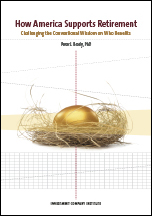“Peter Brady shows how Social Security and tax incentives combine to benefit all working Americans.”
—Senator Orrin G. Hatch
The Benefits of the U.S. Retirement System Are Progressive
Assuring retirement security is a challenge for American workers, for their employers—and for the country’s policymakers. Government policy supports retirement preparedness primarily through two mechanisms: Social Security, which is a mandatory contributory pension for all workers, and tax deferral, which provides incentives for employers to offer and workers to participate in voluntary retirement plans.
 Yet the combined effect of these two mechanisms is poorly understood—and subject to widespread myths.
Yet the combined effect of these two mechanisms is poorly understood—and subject to widespread myths.
In a new book, How America Supports Retirement: Challenging the Conventional Wisdom on Who Benefits, economist Peter Brady of the Investment Company Institute challenges the notion of an “upside-down” retirement system that only benefits the wealthy.
Brady’s innovative work is the first to use a consistent metric—a tax expenditure estimate—to measure the benefits of both tax deferral and Social Security. It illustrates that higher earners benefit more from tax deferral not because of their higher tax rates, but because the design of Social Security creates a strong incentive for them to defer more of their compensation.
In findings that bear directly upon today’s pressing policy debates, Brady demonstrates that the full system of government support for retirement is indeed progressive and warns that tax proposals to limit or fundamentally change tax deferral would actually make the code less fair.
Publications
How America Supports Retirement: Challenging the Conventional Wisdom on Who Benefits (pdf)
How America Supports Retirement: Challenging the Conventional Wisdom on Who Benefits–Japanese Transl...
ICI Global Response to SEBI on Regulations for Foreign Investors
ICI Viewpoints
How America Supports Retirement: Tackling the Myths That Surround Us
How America Supports Retirement: Tackling the Myths That Surround Us – Chinese Translation (pdf)
How America Supports Retirement: Tackling the Myths That Surround Us – Japanese Translation (pdf)
How America Supports Retirement: No, Benefits Are Not “Tilted” to the Higher Earners
How America Supports Retirement: No, Benefits Are Not “Tilted” to the Higher Earners – Chinese Translation (pdf)
How America Supports Retirement: No, Benefits Are Not “Tilted” to the Higher Earners – Japanese Translation (pdf)
How America Supports Retirement: What Do Tax Rates Have to Do with the Benefits of Tax Deferral? Less Than You Think
How America Supports Retirement: What Do Tax Rates Have to Do with the Benefits of Tax Deferral? Less Than You Think – Chinese Translation (pdf)
How America Supports Retirement: What Do Tax Rates Have to Do with the Benefits of Tax Deferral? Less Than You Think – Japanese Translation (pdf)
How America Supports Retirement: The Incentive to Save Is Not Upside Down
How America Supports Retirement: The Incentive to Save Is Not Upside Down – Chinese Translation (pdf)
How America Supports Retirement: The Incentive to Save Is Not Upside Down – Japanese Translation (pdf)
Video
How America Supports Retirement: Correcting Myths About Taxes and Social Security (video)
About the Author
 Peter J. Brady is a senior economist for retirement and investor research at the Investment Company Institute. Brady’s research focuses on pensions, retirement savings, and the taxation of capital income. He is currently president of the National Tax Association. Before joining the Institute, Brady worked as a financial economist at the U.S. Department of the Treasury and as a staff economist at the Federal Reserve Board. He holds a PhD in economics from the University of Wisconsin.
Peter J. Brady is a senior economist for retirement and investor research at the Investment Company Institute. Brady’s research focuses on pensions, retirement savings, and the taxation of capital income. He is currently president of the National Tax Association. Before joining the Institute, Brady worked as a financial economist at the U.S. Department of the Treasury and as a staff economist at the Federal Reserve Board. He holds a PhD in economics from the University of Wisconsin.
Praise for How America Supports Retirement: Challenging the Conventional Wisdom on Who Benefits
“The need to fix Social Security solvency and balance our national budget will surely drive U.S. policymakers to get to work on tax reform very soon. For this reason, the time is ripe to focus our attention on “tax expenditures,” which are provisions letting taxpayers deduct, exclude, or defer components of their income from current taxes. In his fascinating new book, Peter Brady examines how such tax expenditures shape our national retirement system, taking into account both Social Security and company-sponsored retirement plans.
“Some analysts argue that our retirement system is regressive, mainly because they focus only on today’s tax deferrals and ignore future tax receipts that pension and Social Security recipients will pay. But by taking a lifecycle perspective, Brady overturns this view. Instead, he shows that the U.S. retirement system is progressive using a coherent lifetime comparison of Social Security taxes and pension contributions paid, with expected benefits received as well as taxes paid in old age. In other words, taking only a short-term perspective on tax deferrals, without looking at lifetime taxes and benefits, will lead policymakers to the wrong conclusions about how our system works.
“How America Supports Retirement is an accessible and thought-provoking study which should be required reading for those thinking (and voting!) about how retirement plans should be treated under the tax system, as well as everyone working to stabilize Social Security for the future.”
Olivia S. Mitchell
Director of the Pension Research Council of the Wharton School, University of Pennsylvania
“Building on ICI’s solid research demonstrating the strengths of our voluntary, private-sector retirement system, Peter Brady shows how Social Security and tax incentives combine to benefit all working Americans. I urge policymakers on both sides of the aisle to take note of Pete’s valuable and insightful analysis.”
Senator Orrin G. Hatch
President Pro Tempore of the United States Senate and Chairman of the Senate Finance Committee
“A lifecycle perspective is essential for analyzing both Social Security and tax policy toward retirement saving. By combining this analytical approach with painstaking empirical work, this volume offers a wealth of new and often surprising insights. Academics, policymakers, and financial services professionals interested in promoting retirement security will all benefit from studying it.”
James M. Poterba
Mitsui Professor of Economics at MIT and president of the National Bureau of Economic Research
“How America Supports Retirement is long overdue. Peter Brady’s analysis is comprehensive, painstakingly careful, and grounded in the facts. Policymakers need to know those facts—not the myths that obscure them—as they face the challenges of tax and entitlement reform.”
Douglas Holtz-Eakin
President, American Action Forum
“The federal government subsidizes retirement incomes both through Social Security’s progressive benefit formula and through tax incentives for retirement plans. Social Security is seen as progressive while tax preferences are portrayed as favoring the rich. Peter Brady looks closely at how Social Security and tax preferences work together in a surprisingly progressive way to encourage retirement income security.”
Andrew G. Biggs
Resident Scholar, American Enterprise Institute

